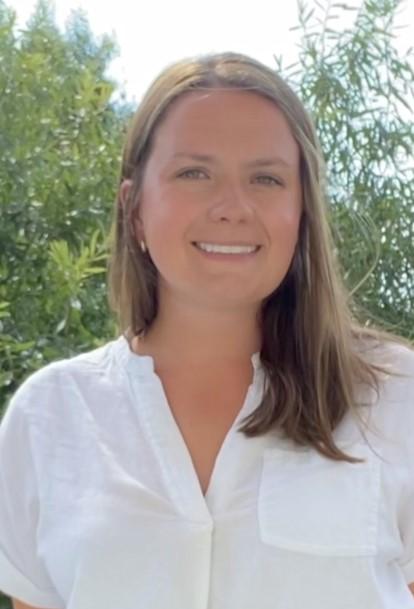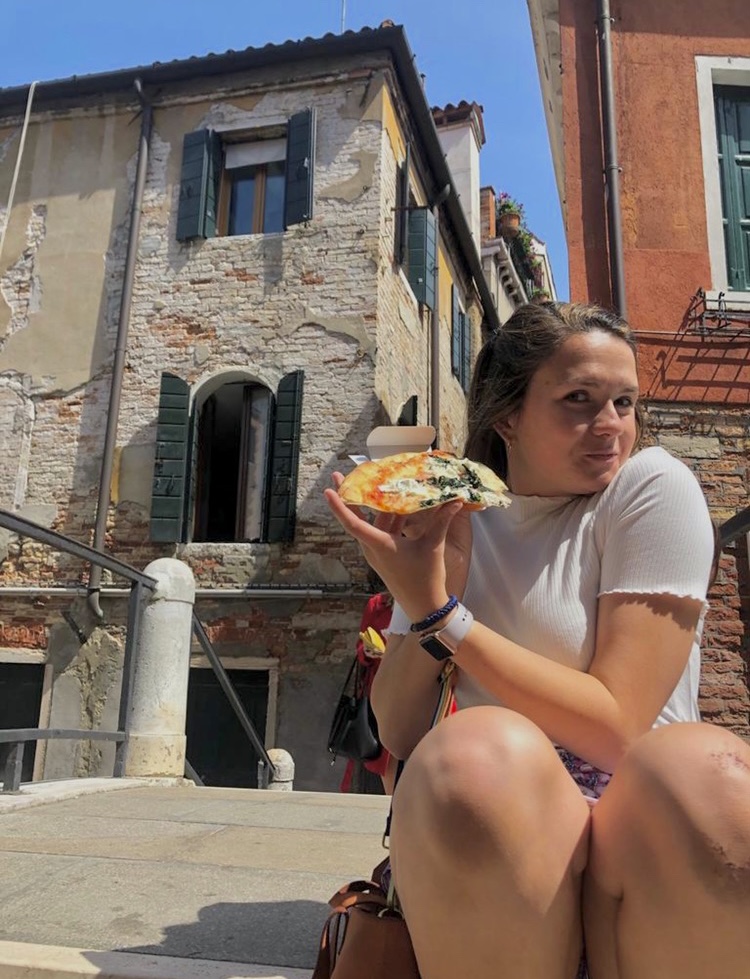
Professionally, Clare Essex lives in two worlds. Within the lab of Laurie Sanders, PhD, and Carol Colton, PhD, in the Duke Neurology Department, she’s working part-time to improve understandings the genetic underpinnings of neurodegenerative disease. Essex spends the other half of her work week as a medical scribe at UNC REX Hospital in Raleigh. For this week’s Spotlight interview, Essex talks about how these two seemingly disparate positions complement each other, the collaboration and creativity that goes into translational research, and her loves of studio art, travel, and being outdoors when she’s not at work.
What are your current responsibilities within the Duke Neurology Department What does a typical day look like for you?
I work as a part-time lab tech in the labs of Laurie Sanders, PhD, and Carol Colton, PhD. Most of my work focuses on the genetic underpinnings contributing to human Parkinson’s disease, including genetic variation and overall genomic integrity. I am currently working on a project investigating mouse models of human Parkinson’s disease (more on this later), and I complete a lot of tissue preparation, imaging, data analysis, and scientific communication surrounding this project.
On a typical day, I am often working as a medical scribe for an outpatient cardiologist in the morning, so I’ll spend my morning seeing patients in the clinic. After lunch, I’ll head to lab, where my day often consists of identifying, preparing, and staining pieces of mouse neural tissue using immunohistochemistry. I then image the tissue using fluorescence microscopy and run data analysis (which involves comparing fluorescence between tissue samples, indicative of relative levels of neuroinflammation or neurodegeneration), and use my findings to adjust our experimental design.
I also get to help train the new faces we have recently acquired in our lab in mouse neuroanatomy, tissue identification, staining, and imaging. We took on three new undergrads and a new lab tech this semester, which has been exciting and has kept us all busy!
What projects are you working on at the moment, and how will that work help us better understand or treat neurodegenerative disease?
One of the big problems in studying neurodegenerative diseases is that the animal models we use as methods of investigation (in our lab, this is mainly mice) don’t always accurately mimic the processes involved in human Parkinson’s disease – as you can imagine, the mouse immune system and human immune system have some fairly significant differences. One such difference is a radical-mediating enzyme called NOS2, which is expressed in mice at levels which far surpass its levels in humans. The excess of this enzyme can interfere with the molecular processes we are trying to mimic and investigate in our mouse models.
The project I am currently working on investigates the efficacy NOS2-knockout mice variants as a model of human Parkinson’s disease. On a less macroscopic level, this involves a lot of immunohistochemistry, staining for different markers of inflammation and neurodegeneration within the neural tissue of mice of various ages and genotypes. The goal here is to help develop more accurate animal models of Parkinson’s disease, which will ultimately allow us to better understand the molecular etiology of the disease, contributing to our ability to identify potential early biomarkers to recognize the disease and therapeutic targets to delay or halt - and hopefully someday, reverse - the progression of the disease.
In addition to your role in the Sanders lab you’re also a medical scribe for UNC REX Healthcare. What does that role involve and how does it compare to your current position?
Working as a medical scribe is fast-paced and inherently interpersonal work – my days at the clinic are spent following around a general cardiologist in clinic (we see roughly one patient every ten minutes) and helping create patient notes for each encounter. This work has a different pace and overall feel than my research, which has longer timelines, is highly creative, and is more independently-driven (though still very collaborative at heart). Both jobs really complement each other: they are both extremely detail-oriented and, at their core, are interested in understanding the etiology of disease and improving the well-being of other humans.
What do you enjoy most about your work?
I really love how collaborative and creative research is. I think non-scientists can sometimes think of our field of work as rigid or unimaginative, but it’s actually quite the opposite.
Also, I get to work alongside very smart, interesting, and funny people, which makes my days in the lab infinitely more enjoyable. I’ll be starting medical school in the fall, so I am enjoying spending this year working alongside and learning from people who are pursuing different career paths than I am.
What’s the hardest part of your job?
Working with mouse brain tissue is extremely delicate and detail-oriented work – one wrong move can tear a piece of tissue that’s taken years and the labor of multiple people to prepare. The tissue slices I work with are about the size of my pinky fingernail and only 40 micrometers thick (for reference, that is significantly thinner than a piece of binder paper) - they’re so delicate that we actually use a thin paintbrush to move them between solutions. The attention to detail required is immense and has to be sustained over long periods of time, and the overall investment of time and labor in each sample adds some pressure to the situation. But, I enjoy the challenge and the tangibility of the work.
What other passions or hobbies do you have outside of Duke?
I minored in Studio Art in college and love painting, printmaking, and embroidery. I also love to read and am a major foodie, so I’ve enjoyed exploring the culinary side of the triangle area. Finally, I love being outside, especially near the water, and can never turn down a trip to the beach or lake – paddleboarding, swimming, and fishing are some of my favorite ways to spend a day off.

Essex shared this photo of her eating pizza in Venice when she studied abroad in 2019.